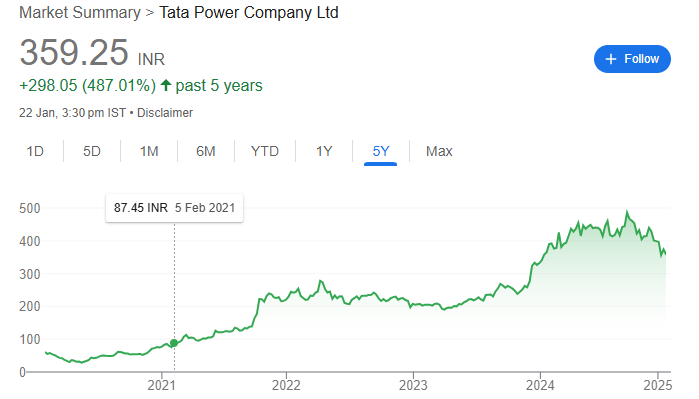Tata Power is one of India’s leading integrated power companies, renowned for its diverse operations in generation, transmission, distribution, and renewable energy. With over a century of expertise and a firm commitment to sustainable practices, Tata Power continues to play a pivotal role in shaping India’s energy sector. In this article, we will explore the potential share price target of Tata Power for 2050, based on its current performance, growth strategies, and future outlook.
Table of Contents
Tata Power: Company Overview
| Metric | Value | Analysis |
|---|---|---|
| Share Price | Rs. 358.85 | The share price suggests the stock is on the higher side. |
| P/E Ratio | 36.77 | A high P/E ratio indicates overvaluation compared to earnings. |
| ROA (Return on Assets) | 4.52% | Below desirable levels, indicating inefficient use of assets. |
| Current Ratio | 0.47 | A low ratio signals potential liquidity concerns in meeting short-term obligations. |
| ROE (Return on Equity) | 15.13% | Healthy, showcasing good returns from shareholders’ investments. |
| Debt to Equity Ratio | 1.24 | Indicates a manageable level of debt in the capital structure. |
| Sales Growth | 13.34% | Modest growth, below expectations for significant performance improvement. |
| Operating Margin | 19.41% | Reflects decent operational efficiency. |
| Dividend Yield | 0.56% | Low yield, which might not appeal to income-focused investors. |
| Earnings Per Share (EPS) | Rs. 9.76 | Indicates moderate profitability per share. |
Strengths:
- Operational Efficiency: A solid operating margin of 19.41% indicates good cost control and operational strength.
- ROE Performance: A strong ROE of 15.13% reflects effective utilization of shareholders’ capital.
- Debt Management: A debt-to-equity ratio of 1.24 indicates that the company is not overly leveraged.
Weaknesses:
- Overvaluation: A high P/E ratio of 36.77 makes it expensive compared to peers.
- Low ROA: The ROA of 4.52% signals inefficient asset utilization.
- Liquidity Concerns: A current ratio of 0.47 raises red flags about the company’s ability to handle short-term liabilities.
- Low Dividend Yield: A 0.56% yield may not attract dividend-focused investors.
Is Tata Power an Attractive Investment?
Tata Power has strengths in operational efficiency and shareholder returns but also shows significant weaknesses such as overvaluation and liquidity concerns. While its financials indicate stability, the high P/E ratio and modest sales growth suggest limited immediate upside.
For long-term investors, Tata Power could be a potential candidate if they believe in its growth story in renewable energy and infrastructure expansion. However, for short-term investors, the high valuation and lower liquidity indicators might pose a risk.
Verdict: Tata Power is moderately attractive for long-term investment but requires cautious evaluation of market conditions and future growth potential.
Share Price Target
Share Price Target Analysis

2025 to 2050 Price Trajectory:
Tata Power’s share price is projected to grow steadily due to its strategic initiatives in renewable energy, robust financial health, and alignment with India’s energy transformation goals. Let’s delve into the price predictions for 2050.
Tata Power Share Price Target 2025 to 2050
| Year | Minimum Price (INR) | Maximum Price (INR) | Remarks |
|---|---|---|---|
| 2025 | 400 | 450 | Strong focus on renewables. |
| 2030 | 700 | 800 | EV infrastructure boost. |
| 2040 | 1,500 | 1,800 | Sustainable energy dominance. |
| 2050 | 3,000 | 3,500 | Global energy leader status. |
Detailed Yearly Projections
Tata Power Share Price Target 2025:
Tata Power is expected to solidify its position in renewable energy, with an anticipated price range of INR 400–450. Increased adoption of solar and wind energy solutions will drive revenue growth.
Tata Power Share Price Target 2030:
The growth in electric vehicles and the establishment of EV charging infrastructure will be a major revenue driver. The share price could range between INR 700 and INR 800.
Tata Power Share Price Target 2040:
By 2040, Tata Power’s investments in smart grids and international markets are expected to yield significant returns. The share price may touch INR 1,500–1,800.
Tata Power Share Price Target 2050:
In 2050, Tata Power could emerge as a global energy leader, with a projected share price of INR 3,000–3,500. Its dominance in renewable energy and technological advancements will drive long-term growth.

Peer Comparison:
| Company | Price (Rs.) | MCap (Cr.) | P/B | P/E | EPS (Rs.) | ROE (%) | ROCE (%) |
|---|---|---|---|---|---|---|---|
| NTPC | 322.45 | 3,12,620.52 | 2.00 | 19.31 | 16.69 | 12.52 | 10.65 |
| Power Grid Corp | 298.55 | 2,76,739.47 | 3.03 | 18.33 | 16.23 | 18.12 | 12.83 |
| Adani Power | 525.25 | 2,02,662.86 | 4.95 | 22.89 | 22.96 | 55.41 | 33.04 |
| Adani Green Energy | 1,030.95 | 1,63,424.63 | 21.59 | 0 | -0.45 | -11.72 | 4.24 |
| Tata Power | 358.75 | 1,14,664.76 | 6.76 | 36.77 | 9.76 | 15.13 | 13.46 |
| Adani Energy Solut. | 801.15 | 96,438.97 | 4.98 | 216.73 | 3.70 | 5.60 | 6.94 |
| JSW Energy | 549.95 | 96,127.27 | 4.50 | 84.87 | 6.48 | 6.64 | 7.90 |
| NTPC Green Energy | 114.20 | 96,026.45 | 5.32 | 259.18 | 0.44 | 6.64 | 9.77 |
| NHPC | 77.75 | 78,110.19 | 2.02 | 26.99 | 2.88 | 10.30 | 7.71 |
| Torrent Power | 1,390.70 | 70,042.59 | 4.17 | 30.55 | 45.50 | 15.60 | 15.69 |
Strengths and Limitations:
| Category | Details |
|---|---|
| Strengths | – Good profit growth: 87.24% (past 3 years) |
| – Good revenue growth: 15.12% (past 3 years) | |
| – Healthy ROE: 25.16% (past 3 years) | |
| – Effective operating margins: 20.15% (last 5 years) | |
| – Efficient cash conversion cycle: 73.24 days | |
| – Strong cash flow management: CFO/PAT = 1.42 | |
| Limitations | – Low tax rate: 11.20% |
| – High P/E ratio: 36.75 |
Tata Power’s consistent focus on renewable energy, innovation, and global expansion positions it for robust growth in the coming decades. While the share price targets for 2050 are optimistic, they are based on the company’s strong fundamentals and future growth prospects. Investors seeking long-term returns may find Tata Power to be a promising addition to their portfolio.
Frequently Asked Questions (FAQ) on Tata Power Stock Analysis
1. What is the current share price of Tata Power?
- The current share price of Tata Power is Rs. 358.85.
2. Is Tata Power overvalued?
- Yes, based on its high P/E ratio of 36.77, Tata Power appears to be overvalued compared to its earnings.
3. How does Tata Power perform in terms of return on equity (ROE)?
- Tata Power has an ROE of 15.13%, indicating good profitability and efficient use of shareholders’ investments.
4. What is Tata Power’s dividend yield?
- Tata Power’s dividend yield is 0.56%, which is relatively low for income-focused investors.
5. Does Tata Power have high debt?
- No, Tata Power has a manageable debt-to-equity ratio of 1.24, indicating a balanced capital structure.
6. How efficient is Tata Power in utilizing its assets?
- Tata Power has a Return on Assets (ROA) of 4.52%, which is below the desirable levels and suggests inefficient use of assets.
7. Is Tata Power growing its revenue?
- Yes, Tata Power has reported a revenue growth of 13.34%, but this is modest and not exceptionally high.
8. How strong is Tata Power’s operating margin?
- Tata Power has an operating margin of 19.41%, reflecting decent operational efficiency.
9. Does Tata Power have strong liquidity?
- No, Tata Power’s current ratio is 0.47, indicating potential challenges in meeting short-term liabilities.
10. Is Tata Power a good investment for long-term investors?
- Tata Power can be a potential investment for long-term investors due to its operational strengths and growth in the renewable energy segment. However, high valuation and liquidity concerns warrant caution.
Disclaimer
The share price targets provided in this article are based on current market trends, company performance, and industry projections. These predictions are speculative and subject to market risks and uncertainties. Investors should conduct their research and seek professional advice before making any investment decisions.

